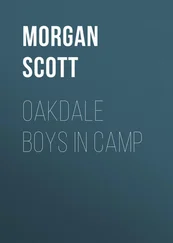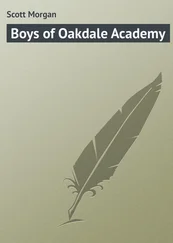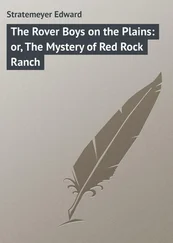Morgan Scott - The New Boys at Oakdale
Здесь есть возможность читать онлайн «Morgan Scott - The New Boys at Oakdale» — ознакомительный отрывок электронной книги совершенно бесплатно, а после прочтения отрывка купить полную версию. В некоторых случаях можно слушать аудио, скачать через торрент в формате fb2 и присутствует краткое содержание. Жанр: foreign_prose, foreign_children, на английском языке. Описание произведения, (предисловие) а так же отзывы посетителей доступны на портале библиотеки ЛибКат.
- Название:The New Boys at Oakdale
- Автор:
- Жанр:
- Год:неизвестен
- ISBN:нет данных
- Рейтинг книги:4 / 5. Голосов: 1
-
Избранное:Добавить в избранное
- Отзывы:
-
Ваша оценка:
- 80
- 1
- 2
- 3
- 4
- 5
The New Boys at Oakdale: краткое содержание, описание и аннотация
Предлагаем к чтению аннотацию, описание, краткое содержание или предисловие (зависит от того, что написал сам автор книги «The New Boys at Oakdale»). Если вы не нашли необходимую информацию о книге — напишите в комментариях, мы постараемся отыскать её.
The New Boys at Oakdale — читать онлайн ознакомительный отрывок
Ниже представлен текст книги, разбитый по страницам. Система сохранения места последней прочитанной страницы, позволяет с удобством читать онлайн бесплатно книгу «The New Boys at Oakdale», без необходимости каждый раз заново искать на чём Вы остановились. Поставьте закладку, и сможете в любой момент перейти на страницу, на которой закончили чтение.
Интервал:
Закладка:
Morgan Scott
The New Boys at Oakdale
CHAPTER I – AN ORDER DISOBEYED
Oakdale started the game by hammering Ollie Leach, the Wyndham pitcher, for three runs in the first inning. Indeed, it seemed that they would drive the schoolboy twirler from the slab in short order, and they might have done so only for a snappy, clean-cut double play which put an abrupt end to the fusillade of hits. When the Wyndham captain declined to make a change and sent Leach back to the mound in the second inning, the wondering Oakdalers told one another that they would finish the foolhardy southpaw then and there.
Leach, however, had steadied down a great deal, and the best the visitors could do was to squeeze in one more run, which they practically secured through a rank error by Pelty, the shortstop. At this point the successful batting of the visitors seemed to come to an abrupt end, for during the succeeding four innings Ben Stone was the only man who could hit the left-hander safely.
Meanwhile, Rodney Grant was doing some steady, clever pitching for Oakdale, which, with perfect support, would have prevented the locals from gathering a single tally. Ned Osgood committed the first costly blunder. Covering third for Oakdale, he attempted to make a fancy play on a grounder, and let it get through him, enabling a Wyndham runner to score from second after two were out.
In the fifth, with two Wyndhamites gone, Charley Shultz, in the middle garden, tried to pull down a fly with one hand when he could have easily reached it with both hands, and his muff gave the locals another valuable mark in the scorer’s book.
Jack Nelson, the Oakdale captain, reprimanded Shultz when, following a strike-out, the team trotted to the bench.
“You should have had that fly, Charley,” said Nelson sharply; “and you would have got it if you’d went after it with both hands instead of one. That’s the first time I’ve seen you drop a ball you could reach as easily as that one. Quit your grandstanding and play baseball.”
Shultz shot Nelson a sullen look. “Oh, what’s the use to holler?” he retorted. “I knew best whether I could reach it with both hands or one. I think I know how to play that field.”
Nelson’s teeth came together with a click, and for a moment, his cheeks burning hotly, it seemed that his annoyance and anger would master him, but he succeeded in holding himself in check.
“You can play the field all right, Shultz,” he said, “and it’s just because you can that I disapprove of that attempted fancy flourish. We’ve got to hold these chaps down somehow.”
“Oh, don’t worry,” laughed Osgood optimistically. “We’ve got them beaten now. We won the game in the first inning.”
“Mebbe we did, but we didn’t paound Lefty Leach off the slab,” reminded Sile Crane. “Gall hang that feller! I hit him once, but I’ll be switched if I can seem to do it ag’in. He’s sorter got me locoed!”
“He seems to have rattled everybody belonging to this whole bunch,” said Chipper Cooper. “We ain’t any of us doing ourselves proud – ’cepting old Stoney.”
Nor did they improve in the first of the sixth. Leach was working a sharp drop that had them all breaking their backs to the distasteful music of the Wyndham cheers. Grant was effective in the latter half, and the seventh opened with him at bat.
“Start us off, Rod,” implored Nelson, as the Texan secured his bat and left the bench. “Let’s sew this thing up with some more runs.”
The fellow from the Lone Star State made no reply, but he squared himself grimly in the batters’ box and took the measure of one of Lefty’s drops. The hit was, appropriately, a Texas leaguer, and the visiting spectators howled joyously as Rod capered to first.
Chipper Cooper, coaching on the line back of first, flapped his arms wildly and crowed like a rooster. As the cheering of the little knot of Oakdale Academy students died down somewhat, Chipper was heard whooping joyously:
“Here we go! The lucky seventh! Don’t try to steal second, Rod; that would be a base thing to do. We’re after old Lefty again, and now we’ll finish the job we started in the first round.”
On the opposite side of the diamond Phil Springer, likewise enthused and excited, was wildly stuttering at the same time:
“Gug-gug-great work, Gug-Gug-Grant. Some cuc-cuc-class to that little bub-bingle. Take a gug-gug-good lead. Shultzie saw how you dud-dud-did it. He’ll drive you round.”
There was in this contest between rival high school nines little of that calculation and method employed by professionals and generally termed “inside baseball.” Nevertheless, Jack Nelson knew the importance of team work and had done his best to drill his players in some of the rudiments. The deadly accuracy of the Wyndham catcher’s throwing to bases was well known to the Oakdale lads, and, with no one down, an attempt to steal seemed inadvisable to Nelson. Shultz, the next batter, had been hitting the ball hard, even though he had found it impossible to place his hits safely, and instantly Nelson spoke a word to him and signalled to the watchful Texan at first that it was to be a hit-and-run.
On previous occasions, with the situation similar, the visitors had seemed to prefer sacrificing; and so, as Shultz confidently took his position at the plate, the infield drew closer, every fellow on his toes to go after a bunt or a short grounder.
Leach made sure his support was prepared for action, and then, wetting his fingers, he handed up a high whistler that had a bit of a jump on it.
Even though the ball was on a level with his cap visor, Shultz managed to hit it, boosting a high fly toward the smiling sky.
Grant was half way down to second when he heard a shrill, warning cry from both coachers.
“Look out! Get back! Skyscraper!” shrieked Cooper.
“Hey! Bub-bub-bub-bub – ” Springer continued to “bub” even after the galloping Texan had plowed his spikes into the ground, brought himself to a halt and turned to race desperately back to the initial sack.
Little Pelty got under that high one and reached for it eagerly in his great desire to make the catch and turn it into a double play by a throw that should reach first ahead of the returning runner. For the moment, with the exception of the still shrieking coachers, every spectator seemed breathless and silent. Pelty got the ball, froze to it and made a beautiful throw, but Grant’s amazing promptness in stopping and getting back at high speed saved him by a yard or more, and he was declared safe at first.
“Pretty close, pretty close,” cried Baxter, the Wyndham captain.
“Missed by a mile,” contradicted Cooper, intensely relieved. “You can’t rope this wild Texas steer; he’s never been branded.”
“Cuc-cuc-come on, Osgood,” implored Springer, as the next hitter was seen to rise from the bench; “you’re the boy to do the trick.”
Already Nelson had given Ned Osgood his instructions.
“Bunt, Osgood,” were his swift words. “They may look for us to follow up with a hit-and-run. Sacrifice Grant along on the second ball pitched. Stone is the next batter.”
That he was right in his judgment concerning the locals was proven by the fact that the infielders resumed their regular positions, while the outfielders fell back a little. Persistent plugging at the hit-and-run game is frequently resorted to by teams having poor success through other methods, and the action of Baxter in signaling his players to fall back showed that he believed an attempt would be made to repeat the play that had been foiled through Shultz’s high infield fly.
Leaning forward in a natural position, with his elbows on his knees and the fingers of his hands interlocked, Nelson thus telegraphed to Grant that the hitter would let the first ball pass and try to sacrifice on the next.
Читать дальшеИнтервал:
Закладка:
Похожие книги на «The New Boys at Oakdale»
Представляем Вашему вниманию похожие книги на «The New Boys at Oakdale» списком для выбора. Мы отобрали схожую по названию и смыслу литературу в надежде предоставить читателям больше вариантов отыскать новые, интересные, ещё непрочитанные произведения.
Обсуждение, отзывы о книге «The New Boys at Oakdale» и просто собственные мнения читателей. Оставьте ваши комментарии, напишите, что Вы думаете о произведении, его смысле или главных героях. Укажите что конкретно понравилось, а что нет, и почему Вы так считаете.












